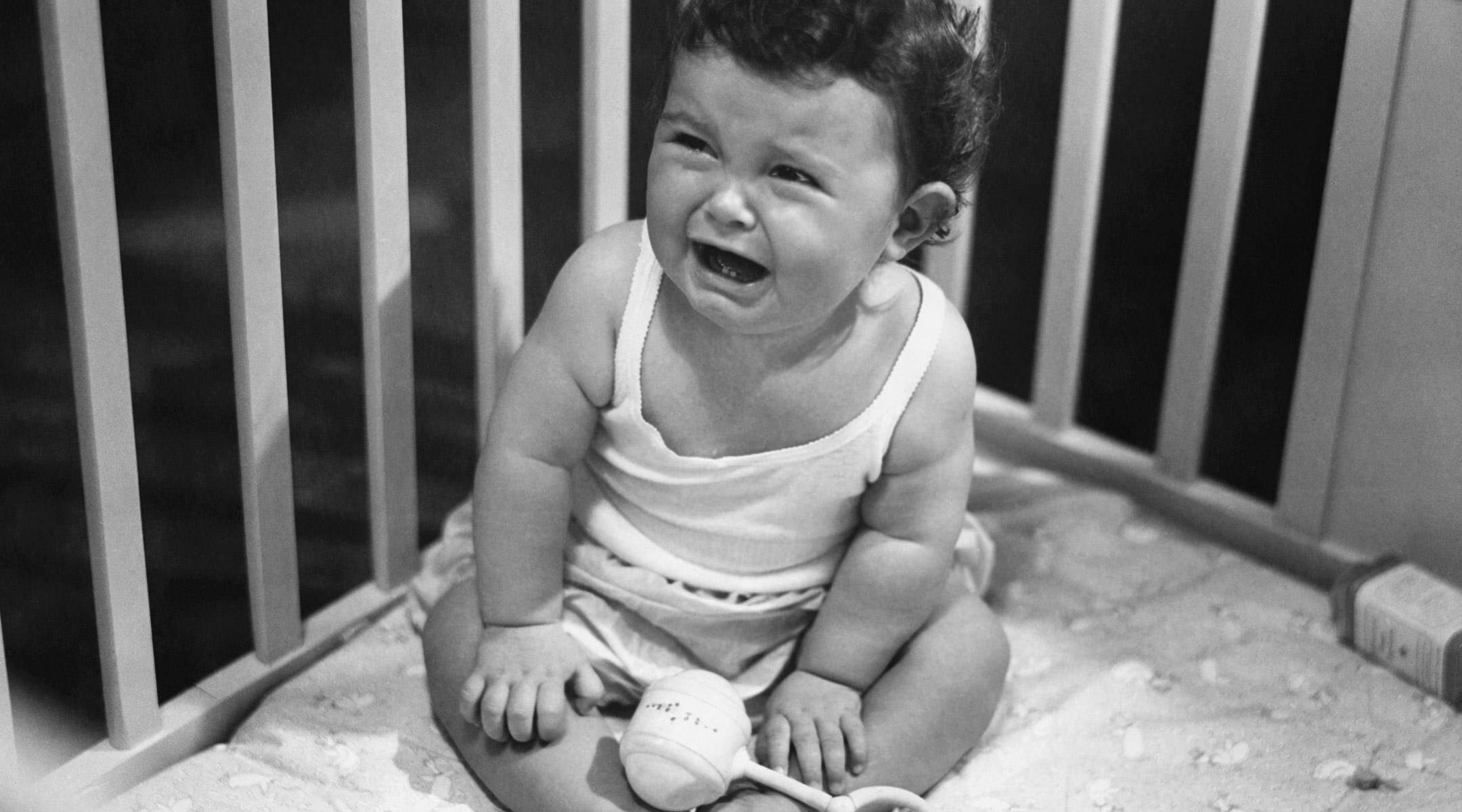Colic 101: How to Help Soothe Your Colicky Baby
First things first—what is colic in babies? You know babies are supposed to cry, but sometimes it can seem like your child’s cries go on a little longer than “normal." Even after you’ve checked their diaper and made sure they’ve been fed and burped, no amount of holding, rocking or jiggling seems to console them or stop their cries. Watching baby sob and writhe in pain, you probably feel helpless and at the end of your rope. Well, you’re not alone.
Like other parents, you’re probably wondering whether baby is suffering from what many of us dread—colic. Even though those cries might make you think otherwise, baby colic generally isn’t a sign of something serious, and it definitely doesn’t mean you’re doing anything wrong. Luckily, colic eventually goes away by itself (it does, we promise). “The good news is that colic won’t last forever,” says Deena N. Blanchard, MD, MPH, a pediatrician at NYU Langone in New York City. Here, we’ll walk you through what colic is, what causes colic, the colic symptoms to look for and colic remedies that might help ease baby’s discomfort.
So what is colic in babies, exactly? As you probably know by now, colic is, well, a lot of crying! All newborns are fussy and cry frequently, especially during the first three months of life. But some babies’ crying goes beyond the normal amounts; colic affects about 20 to 25 percent of infants. In general, colic is typically defined by the “rule of three,” Blanchard says. That’s when an otherwise healthy baby under 3 months of age cries for more than three hours a day, more than three days a week, for more than three weeks in a row for no apparent reason.
Wondering what causes colic in babies? Believe it or not, there’s still no definitive answer for what causes colic, and there’s no test to officially confirm baby has it. “One of the worst sounds a parent can hear is their child crying,” Blanchard says. “Worse yet is when your infant is crying and you can’t figure out why, even after they’ve been fed, burped and changed.” To get to the bottom of things, it helps to know all the possible reasons baby might be showing signs of colic, so you can attempt to use the process of elimination.
Potential causes of colic include:
• Milk allergy. Baby may have a cow’s milk protein intolerance. About 2.5 percent of kids under age 3 are allergic to milk, according to the Food Allergy Research & Education. But most with this allergy will outgrow it during their first year. “Children with this condition have an intolerance to either whey or casein or both, which are proteins found in cow’s milk,” Blanchard says. “They’ll often cry with feedings and you’ll typically find blood in their stool.”
• Your diet. If you’re breastfeeding, there’s a chance colic may be a reaction to your diet. Consider making adjustments to what you eat and drink if you’re breastfeeding and see if that results in less crying. One at a time, you might want to try eliminating caffeine, soy, fish, nuts, egg, dairy, wheat or other possibly irritating foods from your diet and see if baby’s colic symptoms get better. Talk with your pediatrician before you go ahead and switch what you eat. Just be forewarned that this tactic may be unsuccessful. “If your baby is simply just fussy or not sleeping, there is no proof that taking foods out of your diet will make baby better in the long run,” says Barbara Verga, MD, a pediatric gastroenterologist with Atlantic Health System.
• Overfeeding. Some babies may cry if their bellies are too full. Signs of overfeeding include baby turning away or closing their mouth before your normal nursing time is done or their bottle is completed. They may also be spitting up excessively. Baby needs a few hours between feeds for their stomach to empty, Verga notes. Since many parents don’t know what else to do to stop the crying, they often keep feeding a colicky baby. But Verga says to try not to overfeed as you’re only going to make baby feel worse.
• Gas. The painful bloating from gas can be to blame for all those colicky cries. Trouble is, it’s hard to tell if the gas is what’s causing colic or if the colic is leading to gas, due to swallowing too much air while crying for so long.
• Cigarette smoke. Babies of moms who smoke during pregnancy or after delivery, or who live in homes with smokers, tend to be more colicky, Verga says.
• Baby can’t self-soothe. It may just be a neurodevelopmental phase, Verga explains. “Some babies have an immature neurological system that’s not fully developed and they just can’t calm themselves down,” she says.
And then there’s gastroesophageal reflux (GERD) to consider. Blair Hammond, MD, an assistant professor of pediatrics at Mount Sinai Hospital in New York City, notes that GERD can indeed bring about crying in a child—the kind you might mistake for colic. But they’re two separate things. “Colic is much more likely to occur in the evening hours,” Hammond explains. “You might pick baby up and carry them, or give them a pacifier, and they’re soothed for a little bit, but as soon as you put them down, they start crying again.” However, with GERD, she says, “you’ll often see those babies pulling off the breast or the bottle and arching their back, and the fussiness is much more correlated to when baby is actually feeding.”
In truth, some parents are never able to figure out what causes colic in babies, no matter how hard they try. If you find yourself in this boat, remember that it doesn’t reflect on your parenting ability at all. Baby colic is still a bit of a mystery, even to the most seasoned pediatrician. As long as you do your best to take care of baby and meet all their needs, you’re doing a great job, baby colic or not.
Just as you’re settling into life with a new little human in the family and getting used to the lack of sleep: Boom. Baby colic. Dealing with these big emotions at the same time that signs of colic start appearing can make it tough on new parents. “Often, babies with colic will start becoming fussy around 3 weeks of age,” Hammond says. As for when colic peaks, that’s right around 6 to 8 weeks of life. “You’ll see that during this period, babies with colic are often scrunching their abdomen,” she says. “They’ll get red and they’ll be gassy.”
How long does colic last?
In the moment, it may seem like the crying will never stop, but hang in there, because it does. “Colic typically gets better somewhere between nine and 16 weeks,” says Hammond, although it can last as long as six months, according to the American Academy of Pediatrics.
When it comes to babies, crying is pretty par for the course, since it’s often how they communicate early on; normal crying can last up to two hours per day. This might sound like a lot, but as the parent of any colicky baby can tell you, colic reaches an entirely different level. So you might be wondering, “how do I know if my baby has colic?”
When baby cries, a parent’s first course of action is usually to see if they’re tired, hungry, need burping or have a dirty diaper, says Lauren Crosby, MD, FAAP, a pediatrician with La Peer Pediatrics in Beverly Hills, California. “If a parent tries all the usual ways to help a crying baby and they don’t help, it may be colic,” she says.
A colicky baby often seems uncomfortable and scrunches up their little bodies and hands. Baby colic often manifests in crying from 6 p.m. to midnight, regardless of the activity. These colicky cries tend to be louder and more high-pitched than normal crying, making baby sound like they need immediate attention, even if you’re currently giving it to them. This can be really stressful as a parent—particularly because colicky babies tend to be difficult to calm down. Plus, since it can be tough to figure out what causes baby colic, it can feel frustrating and demoralizing.
If you suspect baby’s crying is beyond what is considered normal and you think it might be baby colic, reach out to your pediatrician. They can check your child out and ask some questions to rule out other possible conditions.
Crying and fussing is to be expected in the first few months of life. But if baby is thriving and otherwise healthy—which means baby tolerates feeds, isn’t losing weight, isn’t vomiting, doesn’t have diarrhea and has no fever—and they fall into the “rule of three” mentioned above, they may have colic. So what does colic in babies look like? Keep an eye out for any of the following baby colic symptoms:
• Posture changes. Colicky babies tend to scrunch up their bodies; you might notice baby has tensed stomach muscles, clenched fists and curled up legs.
• Intense, inconsolable crying. Baby doesn’t need anything and appears to be crying for no apparent reason. With baby colic, the crying is more intense with a distressed, higher-pitched tone that’s louder than your child’s typical cry, Blanchard says. Baby may also look bright red and be impossible to comfort and soothe. Colicky cries are likely to happen around the same time every day, typically in the early evening, which some parents refer to as “the witching hour,” Blanchard says. Baby may pass gas or have a bowel movement when it’s finally all over.
Baby colic can be incredibly stressful for parents. If you ever find yourself hitting your limit, place baby down in a safe spot, such as a crib, bassinet or playard, and find a quiet place to take a breath and calm down. Colicky cries can test even the most patient parents, but never shake baby to quiet them; shaken baby syndrome can lead to permanent brain damage and possibly death.
“How do I know if my baby has colic,” you ask? Ultimately your pediatrician will confirm it. “It’s usually a diagnosis of exclusion, meaning there is no other cause for the crying,” Crosby explains. Since baby will have a lot of check-ups in those early days, you’ll have ample opportunity to talk to your child’s doctor if you suspect baby colic.
To diagnose colic, the doctor will start by making sure baby’s growth and development are tracking appropriately, Crosby says. The pediatrician will look for signs of any physical issue, such as GERD, allergies or an infection, and ask about baby’s routines and behaviors to identify if your little one is simply overtired or overstimulated. They’ll likely want to know if baby tends to spit up a lot or has any difficulty or discomfort feeding, or if they wheeze, cough or ever have blood in their stool, Crosby says. They’ll also ask when baby cries during the day, if anything seems to trigger the crying, how long they cry and how long these crying spells have been going on.
Generally speaking, if nothing seems out of the ordinary and baby seems to be healthy, the culprit behind all that crying may be colic.
No one remedy will make those baby colic symptoms go away for good, or even work every time. “Some treatments may not work for your child at all, while some may seem like a lifesaver,” Blanchard says. It’s really about experimenting with different tactics and seeing what works. You can try some or all of these colic remedies to help baby calm down, reduce the intensity of their crying and regain a bit of your sanity. But as always, talk with your pediatrician before starting any colic remedies.
• Anti-gas medications. Over-the-counter gas-relief medications, sometimes known as colic drops (like Infants’ Mylicon), could ease baby’s colic symptoms. These medications are generally safe, unless baby takes thyroid replacement medications. Ask your doctor which brand they recommend before you give anything to baby.
• Probiotics. Some colicky babies may have an imbalance of the “good bacteria” in their digestive tract. Since probiotics help keep that natural balance, some pediatricians, including Hammond, prescribe them for babies who have colic, as long as baby doesn’t have a milk protein intolerance or problem with their immune system. While some doctors have debated their effectiveness, Dyan Hes, a board-certified pediatrician and founder of Gramercy Pediatrics in NYC, says probiotics can also help reduce gas, which is one of the things doctors suspect factors into colic. “Probiotics certainly don’t do any harm, so we’re fine with them,” she says.
You can also experiment with some of these home remedies for colic:
• Offer a pacifier. Baby loves to suck, so help soothe and calm them with a pacifier, even if you normally wouldn’t. Or, offer baby other ways to suck, such as their own thumb or hand. You can also try breastfeeding (just remember not to overfeed!).
• Give a tummy rub or gentle “colic” massage. Use the power of your touch to soothe a colicky baby. For a tummy rub, lay baby belly-down across your knees, then gently rub their back to help release gas. For a soothing massage, slowly stroke their legs, back, arms, chest and face.
• Hold baby upright while feeding. Being in a vertical position may help reduce how much air baby swallows, Blanchard says. Burp them frequently, which also helps reduce gas and may offer some colic relief.
• Swap in formula for colicky babies. If you’re formula-feeding, try one called hydrolysate infant formula, which can sometimes make a difference, especially if baby has a milk intolerance or allergy to cow’s milk. “They can help. They don’t always reduce the crying time, but we try,” Hes says. “Because there’s no specific cure, we try formulas with hydrolyzed proteins or whey protein. For some parents, it’s miraculous.” Just a heads up, though—this special formula is usually more expensive than traditional formula. Still, if you suspect baby has colic, always speak with your pediatrician before switching to a formula for colicky babies, since you want to make sure the change makes sense for baby and that you aren’t just switching to something that’s going to make them feel the same or worse.
• Stick to a bedtime. “One thing I tell parents is that babies can become colicky when they’re tired,” Hammond says. “So in that first month of life, try to make sure baby doesn’t stay up too late. Parents will try to get the baby back to sleep every two hours or so, and as a result, they’re not staying awake for long stretches.”
• Hold baby close. The easiest of home remedies for colic? Cuddle up. Skin-to-skin contact is a great way to soothe a colicky baby. But even if you’re clothed, snuggling baby against your body can go a long way to helping them calm down. If your arms need a break or you’re on the go, put them in a baby sling or carrier (as long as baby is the correct weight for the gear you have). Just make sure you don’t keep your little one in the sling or carrier all day, Verga advises, since it’s important for infants to change positions throughout the day.
• Get baby moving. Babies are familiar with motion from being in the womb, so movement can offer some colic relief. “Babies who tend to cry a lot often respond to motion,” Blanchard says. Put them in a baby swing or vibrating bassinet or seat, rock them in your arms or hold them and sway side to side as you sing or stroke their back gently, Blanchard suggests. You can also put baby in the stroller and walk around the neighborhood or take them on a car ride.
• Play music or white/background noise. Another soothing way to remind a colicky baby of being in your belly? Steady noises that are loud (within reason). Buy a white noise machine or download a white noise app. “Just make sure to place it across the room so you don’t affect your baby’s hearing,” Blanchard says. You can also play some static on the radio, run a fan, vacuum, clothes dryer or hair dryer, or comfort baby with a toy or in a swing or seat that plays calming sounds like ocean waves or a rainstorm.
• Warm bath. When you’re stressed out, you might draw yourself a bath for a relaxing soak. Try the same for a colicky baby; a warm bath is one of the home remedies that may help them relax and chill out.
• Gripe water. Although there’s not a lot of evidence that says gripe water works, some moms swear by it as a natural colic remedy. “Gripe water is perfectly fine to try,” Crosby says. Just speak to your doctor before using gripe water or any other alternative colic remedies and carefully read the instructions so you give baby the right dose.
• Chamomile tea. Another one of the home remedies for colic is something you might enjoy yourself. “Sometimes, you can give baby an ounce of chamomile tea,” Hes says. “Chamomile is a natural relaxant of the tummy, so you can try it and see if it helps.” But only if baby needs it. “If a baby is healthy, don’t give them chamomile tea.” And only do one ounce, once a day. “Babies really aren’t supposed to have water [until they start eating solids], so you only want to give it to a baby who needs it and a very small amount at a time.”
What not to use as a remedy for baby colic
Though it’s popped up on parenting boards, Hes advises against using essential oils to soothe a colicky baby. “Absolutely do not use essential oils!” she says, because they could have adverse effects. “Babies should not be inhaling those scents.”
And then there are so-called baby bottles marketed as “anti-colic.” Says Hes, “yes, there are bottles where you swallow less gas, but there’s no such thing as a true ‘anti-colic bottle.’” So as much as you want to help your colicky baby, beware of advertising claims.
Unfortunately, there’s no way to prevent baby colic. "You can have four kids who are totally not colicky, and then your fifth kid is extremely colicky,” Hes says. And that’s what makes colic so frustrating—it’s still more or less a mystery as to what causes colic in babies. That said, patience and knowing that baby colic too shall pass can make all the difference for parents riding out this short but trying moment.
About the experts:
Deena N. Blanchard, MD, MPH, is a pediatrician at NYU Langone in New York City and serves as a clinical instructor in the department of pediatrics at NYU Grossman School of Medicine. She earned her Master’s of public health from Temple University in 2002 and her medical degree from Albert Einstein College of Medicine in 2006.
Barbara Verga, MD, is a board-certified pediatric gastroenterologist with Atlantic Health System. She earned her medical degree from SUNY Health Science Center at Syracuse.
Blair Hammond, MD, is a board-certified pediatrician and an assistant professor of pediatrics at Mount Sinai Hospital in New York City. She is also the co-founding director and director of medical education for the Mount Sinai Parenting Center. Hammond earned her medical degree from the Dartmouth–Hitchcock Medical Center.
Lauren Crosby, MD, FAAP, is a board-certified pediatrician with La Peer Pediatrics in Beverly Hills, California. She is also a member of and spokesperson for the American Academy of Pediatrics. Crosby earned her medical degree from UCLA School of Medicine.
Please note: The Bump and the materials and information it contains are not intended to, and do not constitute, medical or other health advice or diagnosis and should not be used as such. You should always consult with a qualified physician or health professional about your specific circumstances.
Plus, more from The Bump:
Navigate forward to interact with the calendar and select a date. Press the question mark key to get the keyboard shortcuts for changing dates.




















































